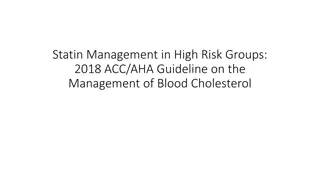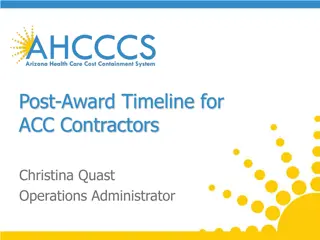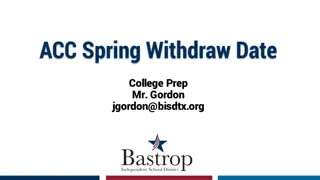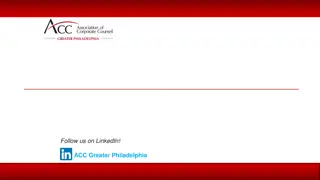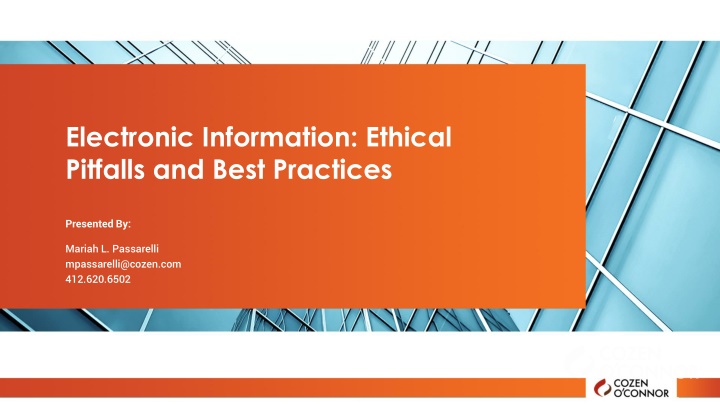
Ethical Pitfalls and Best Practices in Managing Electronic Information
Explore the ethical challenges and best practices surrounding the use of social media and Electronically Stored Information (ESI) in a legal context. From researching prospective employees to handling ESI in litigation, delve into the Rules of Professional Conduct governing lawyers. Gain insights on competence, responsibilities regarding non-lawyer assistance, and more in the realm of electronic information management.
Download Presentation

Please find below an Image/Link to download the presentation.
The content on the website is provided AS IS for your information and personal use only. It may not be sold, licensed, or shared on other websites without obtaining consent from the author. If you encounter any issues during the download, it is possible that the publisher has removed the file from their server.
You are allowed to download the files provided on this website for personal or commercial use, subject to the condition that they are used lawfully. All files are the property of their respective owners.
The content on the website is provided AS IS for your information and personal use only. It may not be sold, licensed, or shared on other websites without obtaining consent from the author.
E N D
Presentation Transcript
Electronic Information: Ethical Pitfalls and Best Practices Presented By: Mariah L. Passarelli mpassarelli@cozen.com 412.620.6502
Introduction As an in-house attorney, navigating employer use of social media and ensuring proper handling of Electronically Stored Information ( ESI ) are tasks packed with potential issues related to the Rules of Professional Conduct governing lawyers. Today we will take a look at the Rules that apply in these contexts as they relate to (1) Prospective Employees; (2) Existing Employees; and (3) Discovery in the context of litigation.
Introduction For better or worse, social media is here to stay and most client documents are ESI, rather than hard copies In-house counsel are often both involved in managing (if not undertaking) litigation, as well as in supervising business functions such as human resources This complicated multi-faceted role presents risks under the Rules of Professional Conduct
The Statistics According to a recent Harris Poll, 67% of employers use social media to research candidates A separate study conducted by CareerBuilder found that 54% of employers stated that they have ruled out a candidate due to finding something on the candidate s social media profile Is there a downside to this method of researching candidates? Yes.
Rule 1.1 - Competence Rule 1.1 A lawyer shall provide competent representation to a client. Competent representation requires the legal knowledge, skill, thoroughness, and preparation reasonably necessary for the representation In the case of in-house counsel, this can often feel like a requirement of omniscience, but it is nonetheless applicable.
Rule 5.3 Responsibilities Regarding Non-lawyer Assistance Rule 5.3 (in pertinent part) With respect to a nonlawyer employed or retained by or associated with a lawyer: (b) a lawyer having direct supervisory authority over the nonlawyer shall make reasonable efforts to ensure that the person s conduct is compatible with the professional obligations of the lawyer
Rule 5.3 Responsibilities Regarding Non-lawyer Assistance Rule 5.3 continued (c) a lawyer shall be responsible for conduct of such a person that would be a violation of the Rules of Professional Conduct if engaged in by a lawyer if: (1) the lawyer orders or, with knowledge of the specific conduct, ratifies the conduct involved; or (2) the lawyer is a partner or has comparable managerial authority in the law firm in which the person is employed, or has direct supervisory authority over the person, and knows of the conduct at a time when its consequences can be avoided or mitigated but fails to take reasonable remedial action.
Rule 8.4 - Misconduct Rule 8.4 (in pertinent part) It is professional misconduct for a lawyer to: (g) engage in conduct that the lawyer knows or reasonably should know is harassment or discrimination on the basis of race, sex, religion, national origin, ethnicity, disability, age, sexual orientation, gender identity, marital status, or socioeconomic status in conduct related to the practice of law.
Knowledge is power, except when its not This means that, if in-house counsel is supervising a hiring process and HR professionals in that process can be seen as taking direction from counsel, those HR professionals must comply with the Professional Rules of Conduct This also means that in-house counsel cannot play any role in hiring decisions that are unlawfully discriminatory While it may be tempting to gain insight into a candidate s personality during the hiring process via social media, this can come with a high downside risk
Knowledge is power, except when its not An employer cannot un-learn information it gains through social media research For example, a social media profile may give an indication of a candidate s religion, sexual orientation, or disability status, whereas none of this information would typically be gained during the application or interview process
Knowledge is power, except when its not This accidental knowledge can form the basis for discrimination claims Example: Joe applies to work at Company. As part of the hiring process, Company reviews Joe s Facebook and learns that Joe is Jewish. When Company later hires Ben (who is not Jewish) instead of Joe, Joe files an EEOC charge alleging religious discrimination under Title VII. In discovery, Joe requests all the notes Company kept regarding the interviews and hiring process. Those notes reveal that his Facebook profile was viewed, lending potential support for Joe s discrimination claim.
Proceed with caution It is possible to use social media for candidate screening, but it must be used carefully Use it all the time, or not at all Develop a checklist of information for which you are looking and record data only related to these factors The individual doing the social media mining should never be the same person making the hiring decision The miner should not relay information outside of the checklist to the hiring person/team
Have you done your homework? A growing number of states have social media and privacy laws. To guide employer use of social media in any aspect, you must familiarize yourself with these laws or risk running afoul of the Professional Rules of Conduct
Have you done your homework? These laws generally limit an employer s ability to: Require an employee/applicant to disclose account credentials (or, in some states, access the account in the employer s presence) Require an employee/applicant to friend or otherwise connect with a company representative Require an employee/applicant to alter privacy settings Discharge, discipline, or otherwise take adverse actions against an individual that exercises their right to keep social media information private
State laws 27 states (and counting) now have laws on the books related to employer use of social media Arkansas California Colorado Connecticut Delaware Hawaii Illinois Louisiana Maine Maryland Michigan Montana Nebraska Nevada New Hampshire New Jersey New Mexico Oklahoma Oregon Rhode Island Tennessee Utah Vermont Virginia Washington West Virginia Wisconsin
Lawful off-duty conduct laws 17 states and Washington D.C. have laws that prohibit employers from discriminating against applicants/employees based upon their lawful use of tobacco off the company s premises and during non-working hours 8 states prohibit this type of discrimination with regard to any lawful consumable good (treatment of marijuana/medical marijuana, legal at the state level, is unclear) 2 states prohibit this discrimination regarding applicant/employee lawful use/possession of firearms
Lawful off-duty conduct laws 2 states prohibit this discrimination regarding applicant/employee reproductive decisions 7 states provide varying levels of discrimination protection for applicants/employees related to their political activity, including voting/ non-voting and political affiliations 13 states expressly prohibit discrimination based upon an applicant s/employee s lawful use of marijuana off of the company s premises during nonworking hours 4 states broadly prohibit discrimination against applicants/employees for engaging in any lawful conduct off the company s premises and outside of working hours
Takeaways If your client intends to use Social Media in the hiring process and you are at all involved in that process, you must familiarize yourself with applicable off-duty conduct and privacy laws You must ensure that your client s use of Social Media in hiring also conforms with applicable federal/state non-discrimination laws To the extent you are giving advice or directing hiring activities, be mindful of the fact that the nonlawyer personnel you are directing must comply with the Professional Rules of Conduct
Rule 4.1 Truthfulness in Statements to Others Rule 4.1 In the course of representing a client, a lawyer shall not knowing: (a) make a false statement of material fact or law to a third person.
Rule 4.3 Dealing with Unrepresented Person Rule 4.3 In dealing on behalf of a client with a person who is not represented by counsel, a lawyer shall not state or imply that the lawyer is disinterested. When the lawyer knows or reasonably should know that the unrepresented person misunderstands the lawyer s role in the matter, the lawyer shall make reasonable efforts to correct the misunderstanding.
Rule 8.4 - Misconduct Rule 8.4 It is professional misconduct for a lawyer to: (c) engage in conduct involving dishonesty, fraud, deceit, or misrepresentation
According to their Facebook It is tempting to look to social media as a resource for investigating employee disciplinary matters However, if you elect to do so, you must do so very carefully, keeping in mind the anti-discrimination laws and lawful off- duty conduct laws we have already discussed Do you review social media in every investigation? In this particular instance, what information are you hoping to learn that would be relevant?
Social Media and the FMLA If there is a no fly zone in this area, it is the use of social media research to support FMLA abuse claims Peer reporting via social media is common, but should not be relied upon as evidence Numerous cases throughout the country have held that an individual appearing to be engaged in social or other physical activities while also on FMLA leave is not evidence of FMLA abuse
Remember Because of the rules of Professional Responsibility and your obligations to nonlawyers whom you supervise, you cannot: Friend a person based on false pretenses, ask someone else to do so, or have knowledge of someone doing so under your supervision Use social media to conduct investigations in a discriminatory way (e.g., only in situations where individuals of a particular race are accused of theft) Authorize the discipline of an employee based on their social media conduct where off-duty conduct laws would prohibit you from doing so
Rule 3.4 Fairness to Opposing Party & Counsel Rule 3.4 (in pertinent part) A lawyer shall not: (a) unlawfully obstruct another party s access to evidence or unlawfully alter, destroy or conceal a document or other material having potential evidentiary value. A lawyer shall not counsel or assist another person to do any such act; (f) request a person other than a client to refrain from voluntarily giving relevant information to another party unless: (1) the person is a relative or an employee or other agent of a client; and (2) the lawyer reasonably believes that the person s interests will not be adversely affected by refraining from giving such information.
Discovery requests It is now commonplace for discovery requests to seek information from individual litigants In the corporate context, this can include supervisors, executives, and in-house counsel, even if these individuals are not named in the litigation This makes the supervisor s/executives/counsel s social media and ESI fair game
Discovery requests It is lawful to request that a supervisor/executive/counsel restrict access to their social media account when litigation arises It is not lawful to counsel a supervisor/executive (or yourself) to delete ESI or social media information after reasonable notice of litigation (and, again, your knowledge that Management or HR has done so is problematic) Consider specifically including ESI and social media activity in litigation hold notices, particularly when you believe such activity may be relevant to the case
ESI and Attorney-Client Privilege A client has a privilege to refuse to disclose and to prevent any other person from disclosing confidential communications made for the purpose of facilitating the rendition of professional legal services to the client This is made complicated by the unique role that in-house counsel play (were you giving legal advice, or weighing in in some other capacity)?
Rules of the Road to Remember Merely involving a lawyer in a communication does not make it privileged, the client has to be asking for (or the attorney has to be rendering) legal advice; a simple Cc is not going to cut it! If you include both clients and non-clients in an otherwise privileged email, it cannot be privileged (limited exceptions for people like auditors and insurers) If you affirmatively place the communication at issue in litigation, it may constitute an implied waiver of the privilege
Rules of the Road to Remember BEWARE: If the attorney was acting as an investigator, it is very unlikely that privilege will apply. Be sure not to blur the lines between the duties of in-house counsel and the duties of, for instance, Risk Management and/or Compliance. If an attorney is wearing more than one hat, adopt clear messaging to include in communications that are intended to be privileged (and be aware that they may not ultimately be deemed so). An attorney providing business advice (separate from actual legal advice) is not covered by the privilege. Could you identify the legal issue you are addressing in the communication. If the answer is no, the privilege is at risk.
For questions (and more help with your employment law dilemmas), contact me! Mariah L. Passarelli Cozen O Connor mpassarelli@cozen.com 412.620.6502




